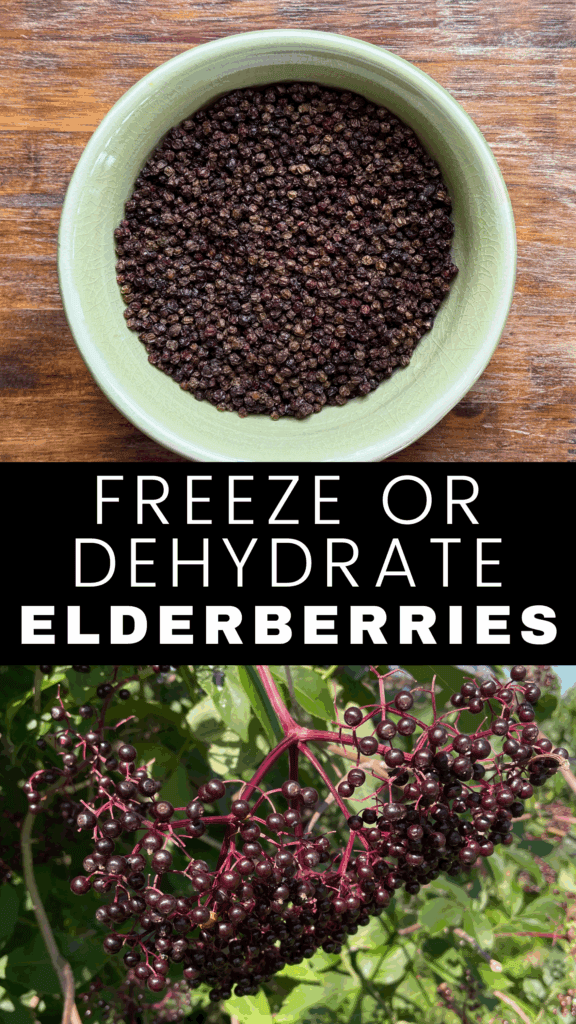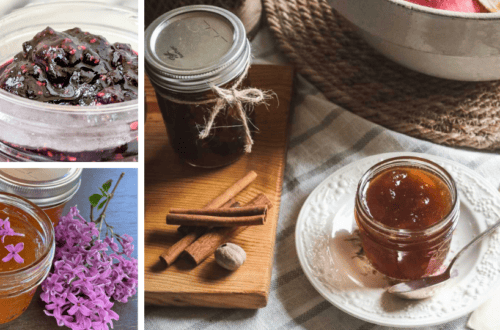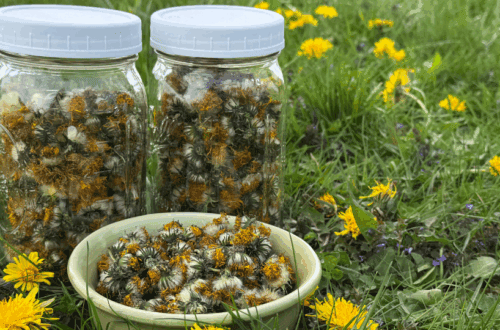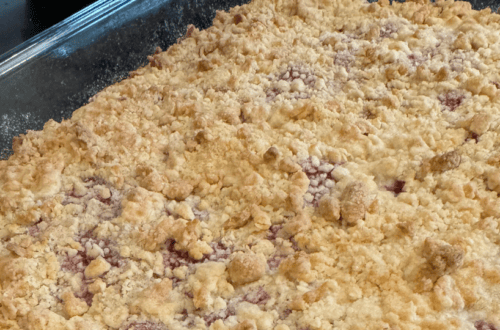How to Freeze and Dehydrate Elderberries for Long-Term Use
Freezing and dehydrating elderberries is the most reliable way to preserve their immune-supportive goodness for year-round use. By freezing, you lock in freshness, and by drying, you create a shelf-stable herb that’s easy to store and use in teas, syrups, jams, or tinctures.
In this post, you’ll learn both methods, freezing for quick access and dehydration for long-term storage, plus tips for safety, storage, and using elderberries throughout the year. For more herbal preservation ideas, check out my Herbal Remedies Page.
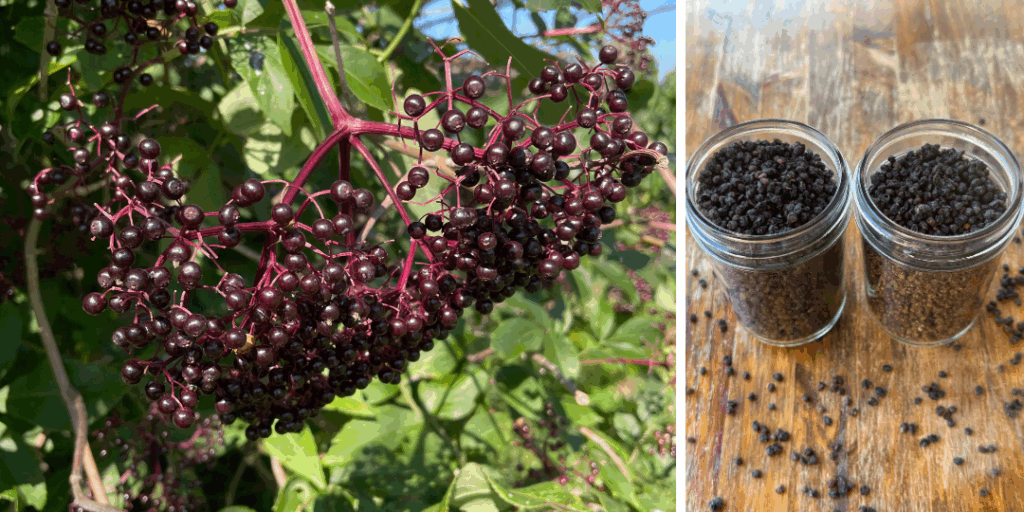
This post contains affiliate links. This will not cost you anything, but will help us offset the cost of running the blog. We only share products we use and would recommend to a friend. Thank you for your support! Click ‘HERE’ for more info.
Quick Summary
- Freeze: Rinse clusters, freeze on trays, then pop off and bag frozen berries.
- Dehydrate: Wash, destem, spread in a single layer, dry at ~130 °F until brittle.
- Store: Freeze in portioned bags; dehydrate into airtight jars for up to 1 year.
Items You’ll Need for Preserving Elderberries
- Colander or strainer – for washing berries thoroughly.
- Large sheet pan – helpful for tray-freezing before storage.
- Freezer-safe bags or containers – for portioning frozen berries.
- Dehydrator (or oven) – for safely drying elderberries at low temps. This is a NO plastic option.
- Airtight glass jars or mylar bags – for long-term storage of dried berries.
- Gloves (optional) – to prevent purple-stained hands while handling large amounts of berries.



Why Preserve Elderberries Now?
Elderberries have a very short harvesting window between late summer and early fall. Fresh berries don’t store well, so preserving them by dehydrating or freezing ensures that you can use them all through the year and continue to enjoy the benefits through teas, syrups, gummies, and tinctures.
Freezing the berries keeps them close to their fresh flavor and texture, while dehydrating allows for easy, shelf-stable storage that can last longer. If you plan to use the berries within 6-12 months, throwing them in the freezer may be the easiest option. Creating a long-term stash of elderberries will require them to be dehydrated.
Benefits of Elderberries
1. Natural Immune Support
Elderberries are packed with antioxidant-rich flavonoids (which are plant compounds), especially anthocyanins, which research says can help the body defend against seasonal colds and flu. While they aren’t a cure, incorporating elderberry syrup, tea, or gummies during the winter months can be a delicious and easy way to support your immune system.
2. Anti-Inflammatory Properties
The same flavonoids that give elderberries their deep purple color also provide natural anti-inflammatory effects. These compounds may help reduce minor aches and inflammation, making elderberries a soothing addition to your herbal wellness routine.
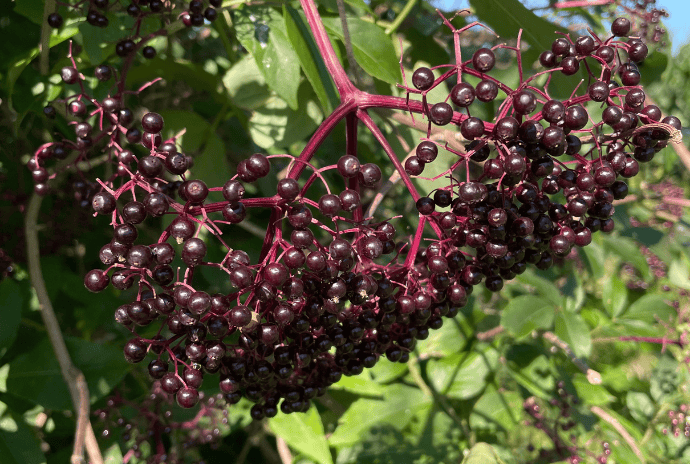
3. Rich in Vitamin C and Nutrients
Elderberries provide a natural source of vitamin C along with small amounts of fiber and other antioxidants. These nutrients play a role in overall wellness, helping to maintain healthy skin and support the body’s natural defenses.
4. Perfect for Herbal Remedies
Because of their flavor and nutrient profile, elderberries are a versatile ingredient for home herbal projects. From classic elderberry syrup and gummies to soothing teas and tinctures, you can preserve the harvest and use it in many forms year-round.
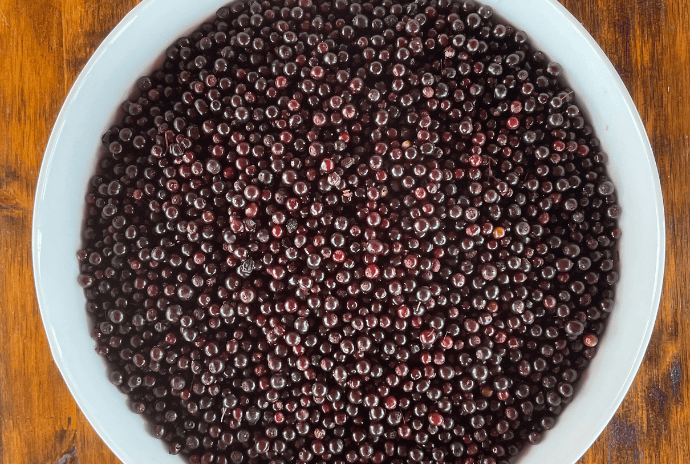
Freezing Elderberries for Best Results
Freezing elderberries is really easy, and you don’t need any special equipment. For easy destemming, rinse the elderberry clusters and pat dry. Remove any leaves, green berries (which are toxic), or large parts of the stem.
Put the whole cluster on a baking sheet and freeze them until solid. Once they’re frozen, the berries will easily come off the stems without making a juicy mess. If you already destemmed the berries before freezing, that’s fine too!
After destemming the elderberries, portion them out into freezer bags or containers so they are ready for your recipe. Seal the bag and get as much air out as possible. Flatten the bags for easier stacking and thawing.
Storage life in the freezer
Frozen elderberries keep up to 6–12 months without quality loss. Make sure you label the bags with the date and the portion, so you can make sure to use the older berries first. If you want your elderberries to last a little longer in the freezer, vacuum seal them to prevent freezer burn.
How to Dehydrate Elderberries Safely
There’s something great about not having to take up freezer space for different herbs and veggies that you want to keep for a while. Dehydrating makes that possible!
Rinse the berries and take them off the stems. Remove leaves, large pieces of stem, and toxic green berries. Freezing the elderberry clusters can make it easier to destem them before dehydrating.
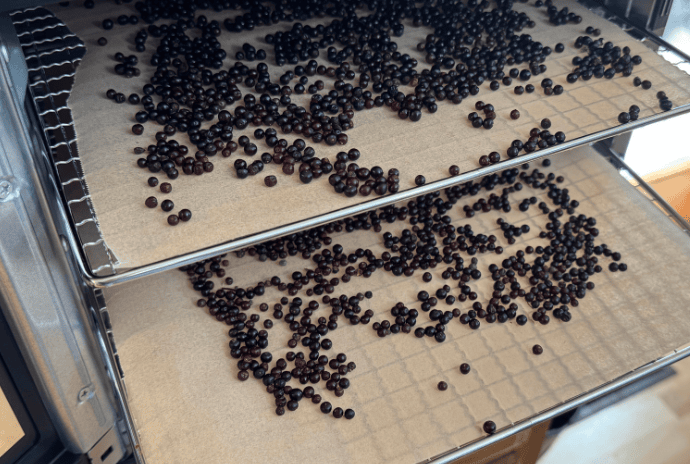
Spread the berries into a single layer on your dehydrator tray. If your trays have larger holes, you can put parchment paper over them so the berries don’t roll off or fall through. Dehydrate at about 135º for about 8 hours, or until they are completely dry.
If you’re using an oven, turn the oven to its lowest setting and crack the door to make sure there’s good airflow. Dry for 6-8 hours, checking periodically for doneness.
Signs that Elderberries are Fully Dried
Dried elderberries should be brittle and hard, not sticky at all. If they are squishy or leathery, keep drying. If you break one of the berries open, there should be no moisture inside.
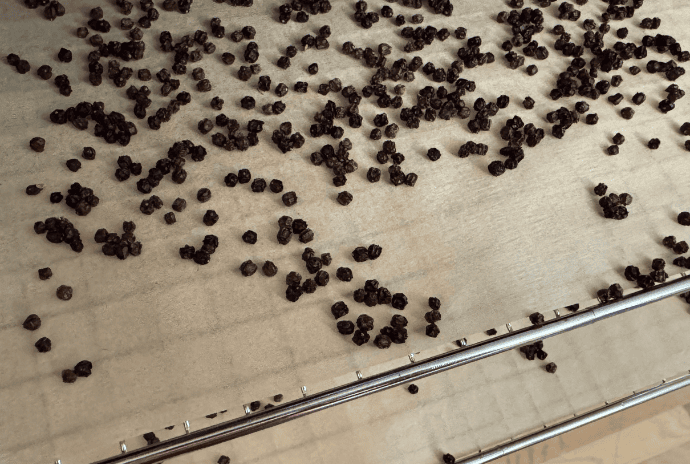
Best Storage Practices for Dried Elderberries
Once the berries are completely dry, store them in glass jars or vacuum-sealed bags, something that is air-tight. Keep them in a cool, dark place to preserve the potency of the berry. You can use oxygen absorbers to extend the shelf life.
Dehydrated elderberries can last 1 year or longer if they are kept very dry and airtight.
Freezing vs. Drying: Which Method Fits Your Needs?
Freezing is fast, you don’t need any special equipment, and it preserves the fresh flavor. Dehydrating makes elderberries lightweight, doesn’t require electricity for storage, they’re travel-friendly, and can have a longer shelf life.
Best Use for Frozen and Dehydrated Berries
Frozen elderberries are best for syrup, jelly, pie fillings, and wine, while dried elderberries are best for teas, tinctures, infused oils, or grinding into powder.
Drying berries is the most versatile method, because they can be rehydrated to make syrup, pie fillings, etc. If you freeze the berries and want to infuse oils or make an elderberry powder, you will have to dehydrate them still. Still, freezing elderberries is convenient, and if you are planning to make syrup or jelly, that is a perfect method to use.
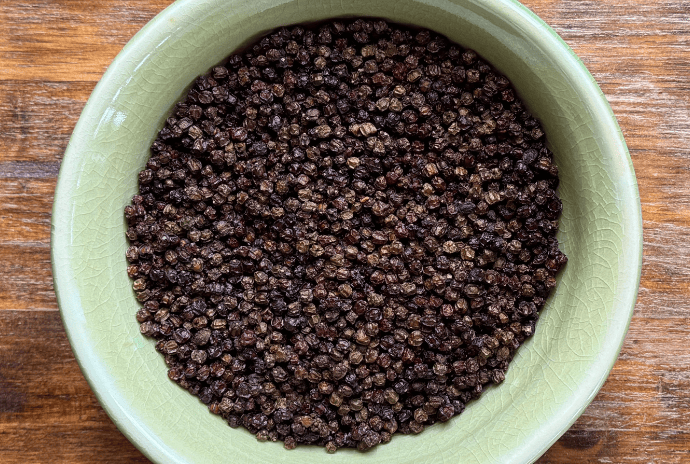
Safety Notes & Handling Tips
It is important to cook elderberries fully before using them. Raw elderberries (and leaves/stems) contain cyanogenic glycosides, which can cause nausea, vomiting, or diarrhea.
Heat destroys these toxins, so always cook berries before consumption.
Remove as many stems as possible before preserving. Ensure that all green berries are removed, because they are higher in toxins. Always use fully ripe berries, which are a deep purple color.
Ways to Use Preserved Elderberries
Once you’ve got elderberries in your freezer or pantry, you’ll be ready to make immune-boosting remedies and cozy recipes all year long:
- Elderberry Syrup – the classic way to support your immune system during cold and flu season. Grab our elderberry syrup recipe plus canning instructions so you can make a big batch for the whole winter.
- Elderberry Gummies – a kid-approved, travel-friendly way to take elderberry syrup. This is an easy recipe that you’ll want to keep on hand. They go quickly but don’t keep long, so plan to make them often!
- Elderberry Teas – steep dried elderberries with cinnamon and cloves for a comforting herbal tea. Combine them with other cold and flu-fighting herbs for a more potent tea.
- Tinctures and Extracts – preserve elderberries in alcohol or glycerin for long shelf life.
- Homemade Jelly – combine with other fruits for a unique, richly flavored jelly.
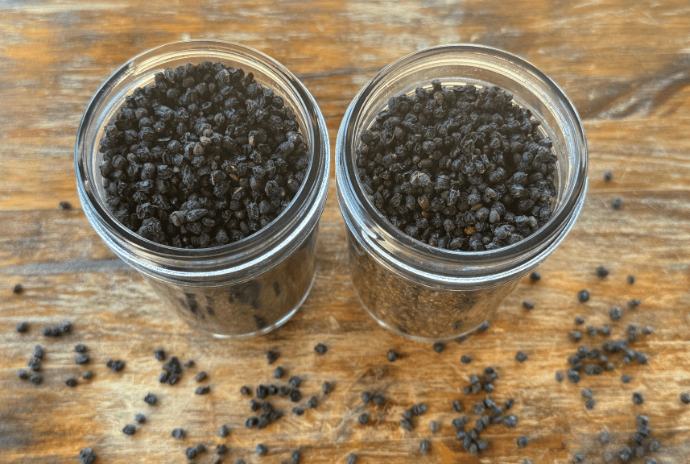
Explore More Herbal Recipes and Techniques
Unlock the world of herbs and natural remedies with ingredients that could already be growing in your yard or area!
- Plantain Salve – A soothing herbal salve that helps calm bug bites, minor cuts, and skin irritations naturally.
- Dandelion-Infused Oil – Golden dandelion blossoms steeped in oil for a skin-nourishing base you can use in balms, salves, or massage oil.
- Lemon Balm Lip Balm – A refreshing, minty balm that helps protect and moisturize lips while naturally supporting cold-sore relief.
- Calendula Baby Balm – Gentle, calming care for sensitive skin—perfect for diaper areas, dry patches, or everyday baby skincare.
- Fig Leaf Tea – A fragrant herbal tea with a light, coconut-like flavor that’s traditionally sipped to support healthy blood sugar and digestion.
FAQs about Preserving Elderberries
Yes! Freeze clusters on a tray; shaking makes de-stemming easier. You can pull the berries off with your fingers or a fork before or after freezing.
With proper airtight storage, dried elderberries last about 1 year, or longer if kept cool and dark.
Nope, just wash and freeze them on a tray. Blanching isn’t necessary.
Yes! In hot, dry climates, you can sun-dry with clean screens and protect from debris and birds.
Raw elderberries contain cyanogenic glycosides, which are neutralized by cooking. Even dehydrated elderberries need to be cooked before consuming.
Ready for Herbal Wellness Year-Round?
Whether you choose to freeze your elderberries or dehydrate them for long-term herbal storage, this guide has you covered. Comment below and let us know when you preserve your harvest. We can’t wait to see how your pantry grows! And for more DIY herbal remedies, check out our Herbal Remedies Page for ideas that nourish all year.
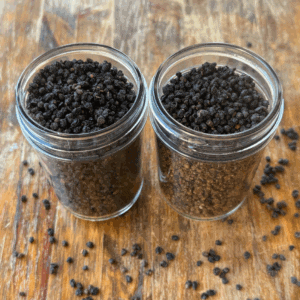
How to Freeze and Dehydrate Elderberries
Equipment
- bags/freezer containers
- baking sheet for freezing or for drying
- dehydrator/oven
- air tight containers
Ingredients
- fresh elderberries
Instructions
Freezing Elderberries
- Rinse the elderberry clusters and pat dry. Remove any leaves, green berries (which are toxic), or large parts of the stem.
- For easy destemmping, put the whole cluster on a baking sheet and freeze them until solid. Once they’re frozen, the berries will easily come off the stems without making a juicy mess.
- After destemming the elderberries, portion them out into freezer bags or containers so they are ready for your recipe. Seal the bag and get as much air out as possible. Flatten the bags for easier stacking and thawing. Put the bags back in the freezer.
- Frozen elderberries keep up to 6–12 months without quality loss. Make sure you label the bags with the date and the portion, so you can make sure to use the older berries first. If you want your elderberries to last a little longer in the freezer, vacuum seal them to prevent freezer burn.
Dehydrating Elderberries
- Rinse the berries and take them off the stems. Remove leaves, large pieces of stem, and toxic green berries. Freezing the elderberry clusters can make it easier to destem them before dehydrating.
- Spread the berries into a single layer on your dehydrator tray. If your trays have larger holes, you can put parchment paper over them so the berries don’t roll off or fall through. Dehydrate at about 135º for about 8 hours, or until they are completely dry.
- If you’re using an oven, turn the oven to its lowest setting and crack the door to make sure there’s good airflow. Dry for 6-8 hours, checking periodically to check for doneness.
- Dried elderberries should be brittle and hard, not sticky at all. If they are squishy or leathery, keep drying. If you break one of the berries open, there should be no moisture inside.
- Once the berries are completely dry, store them in glass jars or vacuum-sealed bags, something that is air-tight. Keep them in a cool, dark place to preserve the potency of the berry. You can use oxygen absorbers to extend the shelf life.
- Dehydrated elderberries can last 1 year or longer if they are kept very dry and airtight.




